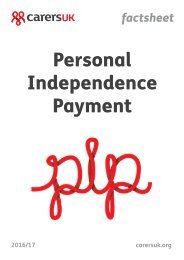data-protection-and-journalism-a-guide-for-the-media-draft
data-protection-and-journalism-a-guide-for-the-media-draft
data-protection-and-journalism-a-guide-for-the-media-draft
You also want an ePaper? Increase the reach of your titles
YUMPU automatically turns print PDFs into web optimized ePapers that Google loves.
Data <strong>protection</strong> <strong>and</strong> <strong>journalism</strong><br />
In practice<br />
The DPA gives more <strong>protection</strong> to some sensitive categories of<br />
in<strong>for</strong>mation. In particular, you should ensure you have a particularly<br />
compelling public interest justification be<strong>for</strong>e collecting in<strong>for</strong>mation about<br />
someone’s health, sex life or allegations of criminal activity.<br />
Although <strong>the</strong>re is a broad exemption <strong>for</strong> public interest <strong>journalism</strong> from<br />
many provisions of <strong>the</strong> DPA, this does not exempt you from prosecution<br />
under section 55. It is an offence if you knowingly or recklessly obtain<br />
personal <strong>data</strong> from ano<strong>the</strong>r organisation without its consent (eg by<br />
blagging, hacking or o<strong>the</strong>r underh<strong>and</strong> methods). There is a public interest<br />
defence, but currently this holds you to a stricter st<strong>and</strong>ard than <strong>the</strong> usual<br />
exemption <strong>for</strong> <strong>journalism</strong>. You should <strong>the</strong>re<strong>for</strong>e be very clear about your<br />
public interest justification be<strong>for</strong>e using such methods.<br />
O<strong>the</strong>r organisations must also comply with <strong>the</strong> DPA, <strong>and</strong> may occasionally<br />
be reluctant to disclose in<strong>for</strong>mation to you <strong>for</strong> this reason. However, in<br />
our view <strong>the</strong> DPA does not prevent genuine public interest disclosures to<br />
journalists.<br />
O<strong>the</strong>r organisations can generally provide you with in<strong>for</strong>mation about<br />
someone without breaching <strong>the</strong> DPA if <strong>the</strong>y are satisfied that <strong>the</strong><br />
disclosure is justified in <strong>the</strong> public interest. If <strong>the</strong> public interest<br />
justification is sufficiently compelling, this would mean that <strong>the</strong> disclosure<br />
would be fair <strong>and</strong> meet <strong>the</strong> ‘legitimate interests’ condition (see page 16),<br />
<strong>and</strong> would not breach <strong>the</strong> first principle. If <strong>the</strong> in<strong>for</strong>mation in question is<br />
sensitive personal <strong>data</strong>, <strong>the</strong>re is a specific condition to allow a public<br />
interest disclosure to journalists if it is related to wrongdoing or<br />
incompetence (see page 17). And, in our view, a genuine public interest<br />
disclosure to a journalist would generally not be incompatible with an<br />
organisation’s purposes, <strong>and</strong> so would not breach <strong>the</strong> second principle.<br />
Of course, <strong>the</strong> issue may really be that <strong>the</strong> organisation in question does<br />
not agree with your view of <strong>the</strong> public interest, or in fact has o<strong>the</strong>r<br />
overriding legal, professional or reputational reasons to refuse to disclose<br />
<strong>the</strong> in<strong>for</strong>mation. They must satisfy <strong>the</strong>mselves that <strong>the</strong> disclosure would<br />
be fair <strong>and</strong> lawful, <strong>and</strong> <strong>the</strong> DPA cannot oblige <strong>the</strong>m to supply you with<br />
in<strong>for</strong>mation if <strong>the</strong>y have doubts.<br />
DRAFT 35




